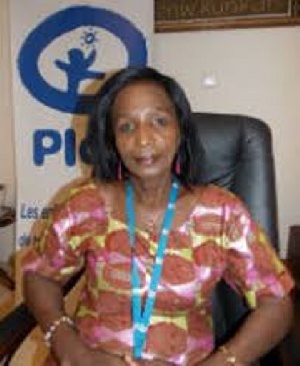 Plan International Ghana is an NGO with a five-year Girls Advocacy Alliance project
Plan International Ghana is an NGO with a five-year Girls Advocacy Alliance project
Mrs Fadimata Alainchar, the Country Director of Plan International Ghana, has observed that of all the West African countries, Ghana is closest to achieving the Millennium Development Goals (MDGs).
“And looking at how the SDGs goals are being worked around to be achieved, there is no doubt that Ghana will make headway in that too, however, economic growth, population growth and increase in economic outcomes if not well handled will hinder the progress,” she said.
Mrs Alainchar said this at the GAA Lunch Desk (GLD) in Accra on Thursday where stakeholders engaged as well as held themselves accountable as duty bearers in the implementation of policies and practical plans to help address inhumane and unjust practices meted out to women, children and the youth.
Plan International Ghana is a Non-Governmental Organisation with a five-year Girls Advocacy Alliance project aimed at helping to eliminate gender-based violence and abuses meted out to women.
The Alliance, which is being funded by the Ministry of Foreign Affairs and Regional Integration, seeks to create a free and safe environment for women and girls in the country.
Mrs Alainchar said the laws, policies and plans to fight gender-based violence must be implemented and called on NGOs to establish networks with community women in the fight against those abuses to pave the way for their active participation in initiatives and decision-making.
She appealed to government, civil society groups and all stakeholders to join forces in empowering women for change.
Mrs Anna N. Nabere, the Project Manager, said to complement the efforts of government, Plan International Ghana, in collaboration with the Dutch Embassy, was taking up this high level engagement with relevant stakeholders at the national level to discuss ways of increasing access to Technical and Vocational Education Training (TVET) and decent work opportunities for girls.
She said the approach would enable the project team to contribute to the effective implementation of youth employment interventions by government.
“As part of setting the agenda for advocating for improved access to TVET and decent work opportunities, Plan International Ghana, in collaboration with the Dutch Embassy, is organising this meeting to get stakeholders understand the issues and their roles in addressing decent work deficits for girls and young women in Ghana.
“The objective is to deal with child marriage, commercial sexual exploitation of children and child sex tourism as well as harnessing technical and vocational capacity for national development being the four main thematic areas it seeks to address to create opportunities and a decent environment for girls,” she said.
“By the end of this GAA Lunch Desk stakeholders should be able to open up other opportunities for engagement by the project team,” she said.
Mrs Nabere accepted that the task ahead was not going to be easy but it was important to empower girls at all cost to bring about the needed development.
She said in all the fights towards achieving girls’ rights and traditional practices had been the main obstacle for change and, thus, there was the need to critically look at those practices.
A maximum of 25 participants attended the GLD to discuss issues of concern to the project.
Participants included the Minister of Gender, Children and Social Protection, Minister of Education, Minister of Employment, members of the Trades Union Congress, COTVET, Unilever, and Fan Milk.